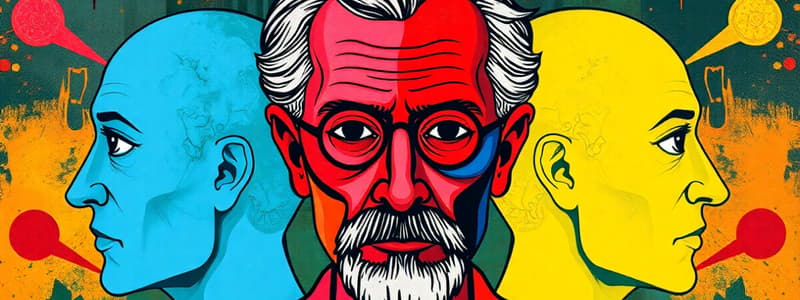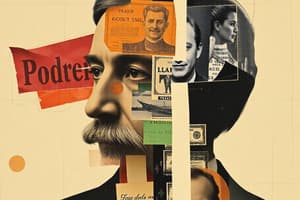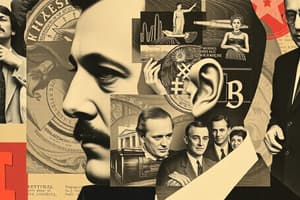Podcast
Questions and Answers
What is the focus of the latency stage in personality development?
What is the focus of the latency stage in personality development?
- Development of the Oedipus complex.
- Sexual feelings are awakened with appropriate targets.
- Sexual feelings are repressed while developing in other ways. (correct)
- Formation of neurotic personalities.
Which Neo-Freudian theorist proposed that feelings of inferiority drive personality development?
Which Neo-Freudian theorist proposed that feelings of inferiority drive personality development?
- Alfred Adler (correct)
- Erik Erikson
- Karen Horney
- Carl Gustav Jung
What does the Electra complex refer to in psychological development?
What does the Electra complex refer to in psychological development?
- A girl's sexual attraction to her opposite-sex parent. (correct)
- The development of neurotic behaviors.
- Anxiety stemming from feelings of inferiority.
- The process of repressing sexual feelings during latency.
What concept did Karen Horney introduce to counter Freud’s notion of penis envy?
What concept did Karen Horney introduce to counter Freud’s notion of penis envy?
Which aspect did Erik Erikson emphasize in his theory of personality development?
Which aspect did Erik Erikson emphasize in his theory of personality development?
What is the function of the superego in personality development?
What is the function of the superego in personality development?
What is a key characteristic of an anal-retentive personality?
What is a key characteristic of an anal-retentive personality?
Which stage of psychosexual development involves the mouth as the erogenous zone?
Which stage of psychosexual development involves the mouth as the erogenous zone?
What can result from a fixation at the oral stage?
What can result from a fixation at the oral stage?
During which age range does the anal stage occur in personality development?
During which age range does the anal stage occur in personality development?
Which part of personality is described as being completely unconscious and pleasure-seeking?
Which part of personality is described as being completely unconscious and pleasure-seeking?
What characterizes the Ego in Freud's model of personality?
What characterizes the Ego in Freud's model of personality?
What principle governs the functioning of the Id?
What principle governs the functioning of the Id?
How does the Superego influence behavior according to Freud?
How does the Superego influence behavior according to Freud?
What is the role of the unconscious mind in Freud's theory?
What is the role of the unconscious mind in Freud's theory?
What does the reality principle refer to in Freud's theory of personality?
What does the reality principle refer to in Freud's theory of personality?
Which term describes the enduring characteristics with which each person is born?
Which term describes the enduring characteristics with which each person is born?
What value judgments are made about a person’s behavior referred to as?
What value judgments are made about a person’s behavior referred to as?
What is the main focus of humanistic theories of personality?
What is the main focus of humanistic theories of personality?
Which concept describes the interaction between environment, personal characteristics, and behavior as proposed by Bandura?
Which concept describes the interaction between environment, personal characteristics, and behavior as proposed by Bandura?
Which of the following is NOT a proposed influence on personality according to social-cognitive learning theory?
Which of the following is NOT a proposed influence on personality according to social-cognitive learning theory?
What does self-efficacy refer to in Bandura's framework?
What does self-efficacy refer to in Bandura's framework?
Which of the following concepts relates to an individual’s perception of control over events in their life?
Which of the following concepts relates to an individual’s perception of control over events in their life?
What primary aspect does behavioral theory categorize personality as?
What primary aspect does behavioral theory categorize personality as?
Which of the following statements correctly reflects a limitation of behaviorism in personality formation?
Which of the following statements correctly reflects a limitation of behaviorism in personality formation?
Which of the following concepts is primarily associated with Freudian psychoanalytic theory and is not supported by scientific research?
Which of the following concepts is primarily associated with Freudian psychoanalytic theory and is not supported by scientific research?
What is the primary focus of the Self-Actualizing Tendency in Carl Roger's Theory?
What is the primary focus of the Self-Actualizing Tendency in Carl Roger's Theory?
How is the Real-Self defined in Roger's theory?
How is the Real-Self defined in Roger's theory?
What distinguishes Unconditional Positive Regard from Conditional Positive Regard?
What distinguishes Unconditional Positive Regard from Conditional Positive Regard?
Which of the following best describes the concept of Ideal-Self?
Which of the following best describes the concept of Ideal-Self?
In Trait Theory, what method did Raymond Cattell use to reduce the number of traits?
In Trait Theory, what method did Raymond Cattell use to reduce the number of traits?
What are Surface Traits according to Cattell's Trait Theory?
What are Surface Traits according to Cattell's Trait Theory?
What was Gordon Allport's contribution to Trait Theory?
What was Gordon Allport's contribution to Trait Theory?
What is a key goal of Trait Theories of Personality?
What is a key goal of Trait Theories of Personality?
Flashcards are hidden until you start studying
Study Notes
Personality
- Personality is the unique and relatively stable way people think, feel, and behave. This encompasses a broad range of characteristics including emotional responses, decision-making patterns, and interpersonal interactions, which contribute to one's individuality.
- Character refers to moral and ethical judgments made about someone's behavior. It involves the values and principles that guide decisions and actions, shaping how a person is perceived in moral contexts within society.
- Temperament is the enduring characteristics present at birth. These are biologically based and encompass aspects such as activity levels, emotional reactivity, and sociability, forming the foundation on which personality is built as individuals grow and develop.
Psychodynamic Perspective
- Freud's psychoanalytic theory views personality as a result of unconscious conflicts in the mind. He emphasized that much of human behavior is influenced by desires and fears that individuals are not consciously aware of, stemming from childhood experiences.
- The mind is divided into conscious, preconscious, and unconscious levels. The conscious mind contains thoughts and feelings we are aware of, the preconscious holds memories and information that can be accessed easily, while the unconscious consists of instincts, traumas, and hidden desires that influence behavior more subtly.
- The Id is the primitive, pleasure-seeking part of the personality, seeking immediate gratification. It is present from birth and represents raw biological urges, such as hunger, thirst, and sexual desires.
- The Ego develops from the need to deal with reality, operating on the reality principle, delaying gratification. It mediates between the desires of the Id and the constraints of the real world, helping individuals navigate social norms and expectations.
- The Superego acts as the moral conscience, based on societal values and internalized rules. It develops as a child interacts with caregivers and society, which instills a sense of right and wrong, striving for perfection and judging actions based on learned ethical standards.
Psychosexual Stages
- Freud proposed five psychosexual stages: Oral, Anal, Phallic, Latency, and Genital. Each stage corresponds to a different focus of pleasure and development, influencing personality traits and behaviors in adulthood depending on whether the conflicts at each stage are resolved or experience fixation.
- Each stage is marked by an erogenous zone and potential for conflict. Successful navigation through these stages allows individuals to develop a healthy personality, while unresolved conflicts may lead to psychological issues.
- Fixation occurs when a conflict in a particular stage is not resolved. This can result in behaviors and personality traits that reflect the issues faced during that stage, such as oral fixation leading to smoking or nail biting in adulthood.
- Oral stage is the first stage, from birth to 18 months, focused on oral gratification. During this stage, infants derive pleasure from activities involving the mouth, such as sucking, biting, and chewing, which later influence dependency and trust issues.
- Anal stage is the second stage, from 18 months to 36 months, focused on toilet training. Successfully navigating this stage fosters a sense of autonomy, while fixations can lead to traits such as excessive tidiness or messiness, often referred to as anal-retentive or anal-expulsive behaviors.
- Phallic stage is the third stage, from 3 to 6 years of age, focused on developing sexual feelings. This stage deals with the Oedipus and Electra complexes, with children developing attachment to the opposite-sex parent while feeling rivalry towards the same-sex parent.
- Latency stage is the fourth stage, from 6 to puberty, where sexual feelings are repressed. During this period, children typically focus on developing social skills, friendships, and academic abilities, channeling their energy into more socially acceptable activities.
- Genital stage is the fifth stage, starting at puberty, where sexual feelings re-emerge with appropriate targets. It represents the maturation of sexual interests and the establishment of mature sexual relationships, contributing greatly to adult personality.
Neo-Freudians
- Neo-Freudians were followers of Freud who developed their own theories, expanding and modifying Freudian concepts while incorporating social and cultural factors that Freud initially overlooked.
- Carl Gustav Jung expanded on the unconscious with the personal and collective unconscious. He introduced the idea of archetypes, universal symbols and themes that resonate across cultures, which he believed were influential in shaping an individual's personality and behavior.
- Alfred Adler proposed that feelings of inferiority are a driving force behind personality. He suggested that people are motivated by striving for superiority to overcome perceived inadequacies, leading to both positive accomplishments and, at times, maladaptive behaviors.
- Karen Horney challenged Freud's concept of penis envy with the idea of womb envy. She argued that cultural and social factors heavily influence personality, emphasizing basic anxiety stemming from social relationships as a critical component in personality development and psychological distress.
- Erik Erikson focused on social rather than sexual relationships, proposing stages throughout the lifespan. His theory of psychosocial development includes eight stages, each characterized by a psychological conflict that must be resolved for healthy personality development.
Behaviorist and Social Cognitive Perspective
-
Behaviorism views personality as a set of learned responses or habits. Behaviorists believe that observable behaviors, rather than internal processes, are the primary basis for understanding personality, emphasizing conditioning as a key mechanism of behavioral acquisition.
-
Social-Cognitive learning emphasizes the importance of the influence of other people's behavior and a person's expectations on learning. This perspective incorporates cognitive processes, highlighting how individuals assess their experiences and the social environments that shape their actions.
-
Bandura's Reciprocal Determinism proposes an interaction between environment, personality, and behavior to shape future behavior. This concept illustrates that personal factors (like beliefs), behaviors, and environmental influences are mutually influential in determining actions.
-
Self-efficacy refers to a person's belief in their ability to perform a behavior effectively. Higher levels of self-efficacy influence the choice of activities, the effort applied to tasks, and perseverance in the face of challenges, impacting overall personality development and outcomes.
-
Rotter's Social Learning Theory focuses on locus of control, either internal or external, and how people's expectancies shape their behaviors. An internal locus of control suggests that individuals believe they can influence outcomes through their actions, while an external locus implies that they attribute results to external forces beyond their control.
Humanistic Perspective
- Humanistic psychology focuses on uniquely human aspects like subjective feelings, freedom of choice, and self-actualization. This perspective emphasizes the intrinsic value of humans and the potential for personal growth and fulfillment, advocating for a positively oriented view of human nature.
- Carl Rogers' theory proposes the self-actualizing tendency as a drive to fulfill one's potential. He posited that each individual has a natural desire to grow and achieve personal goals, leading to the development of a healthy personality.
- The self-concept is developed through interactions with significant others. It includes perceptions and beliefs about oneself, shaped by feedback from peers, family, and broader cultural influences, affecting self-esteem and motivation.
- The real-self is one's perception of their own characteristics. It encompasses how individuals view themselves at present, including their strengths and weaknesses, which can clash with their ideal-self and lead to personal dissatisfaction.
- The ideal-self is one's perception of who they would like to be. This aspirational image influences behavior and decisions, as individuals gauge their actions against this ideal, ultimately striving for coherence between their real and ideal selves.
- Unconditional positive regard is necessary for healthy personality development. Rogers argued that acceptance and support, irrespective of a person's actions or feelings, foster the environment conducive to growth and self-actualization, promoting psychological well-being.
Trait Theories
- Trait theories aim to describe enduring personality characteristics to predict behavior. These theories focus on identifying specific traits that serve as a basis for understanding and analyzing individual differences across various contexts.
- Gordon Allport was the first to develop a list of traits, believing them to be part of the nervous system. Allport categorized traits into cardinal, central, and secondary traits, with cardinal traits representing dominant characteristics that shape a person's behavior and decision-making.
- Raymond Cattell used factor analysis to reduce the number of traits to 16-23, differentiating between surface and source traits. Cattell's work contributed to the understanding of how underlying factors shape behaviors and traits, allowing for a more structured and empirical approach to personality assessment, eventually leading to the development of tools like the 16 Personality Factor Questionnaire.
Studying That Suits You
Use AI to generate personalized quizzes and flashcards to suit your learning preferences.




